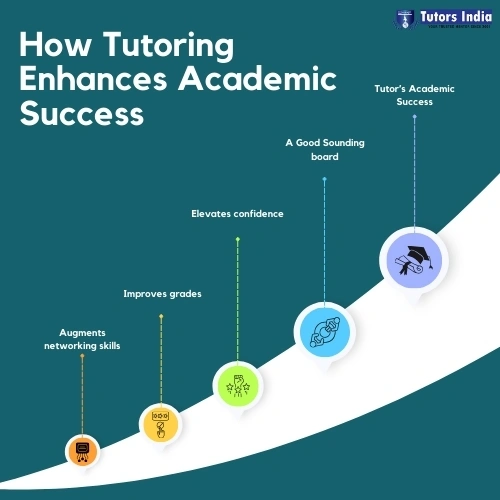Tuition centers play a crucial role in enhancing the academic performance of students, especially for those in grades 1st through 12th. These centers provide personalized attention, structured learning environments, and strategies that help students succeed in their studies. Here are some key ways tuition centers enhance learning for students:
1. Personalized Attention

- Individualized Learning: In a classroom, a teacher may not always have the time to address every student’s unique needs. Tuition centers, however, offer smaller class sizes or even one-on-one sessions, allowing tutors to tailor lessons to each student’s pace and learning style.
- Focused Support: Teachers can focus on specific areas where a student is struggling, helping them grasp concepts more effectively than in a larger class setting.
2. Customized Learning Plans

- Assessing Strengths and Weaknesses: Tuition centers assess students’ strengths and weaknesses in different subjects to create customized study plans. These plans target areas that need improvement, making learning more effective.
- Flexible Curriculum: Tutors adapt their teaching materials and methods based on the student’s needs. Whether it’s reinforcing foundational concepts or challenging students with advanced topics, tuition centers provide a flexible approach to learning.
3. Boosting Confidence and Motivation

- Positive Reinforcement: Regular feedback and encouragement help build students’ confidence. When students understand the material and see their progress, they become more motivated to continue their studies.
- Support for Exam Preparation: Many tuition centers offer exam-specific training and practice sessions, helping students feel more prepared and less anxious about upcoming tests.
4. Effective Time Management
- Structured Schedules: Tuition centers teach students time management skills by helping them organize their study schedules. They guide students in balancing schoolwork, extracurricular activities, and relaxation, ensuring efficient use of their time.
- Consistency: With regular classes and homework assignments, students learn the importance of staying consistent with their studies, which helps them stay on top of their academic responsibilities.
5. Addressing Learning Gaps
- Reinforcing Core Concepts: Tuition centers ensure that students don’t fall behind in core subjects such as mathematics, science, and language. Tutors work with students to fill any gaps in their understanding, preventing future struggles with more advanced topics.
- Remediation and Revision: For students who may have missed key lessons or struggled to understand previous topics, tuition centers provide remediation sessions to ensure they are prepared for future learning.
6. Enhanced Problem-Solving Skills

- Interactive Teaching: Many tuition centers use interactive teaching methods such as discussions, quizzes, and hands-on activities. These methods not only make learning more engaging but also enhance problem-solving skills.
- Critical Thinking: Students are encouraged to think critically and approach problems from different angles, which enhances their ability to solve complex questions both in class and during exams.
7. Subject-Specific Expertise
- Specialized Tutors: Tuition centers often hire teachers who specialize in specific subjects. This expertise allows students to gain a deeper understanding of the material and receive more targeted assistance in challenging subjects like advanced mathematics, chemistry, or literature.
- Up-to-Date Knowledge: Tutors at tuition centers stay updated on the latest curriculum changes and exam formats, ensuring that students are always prepared for the most recent academic standards.
8. Preparation for Competitive Exams

- Focused Exam Coaching: For students aiming for competitive exams such as entrance exams, tuition centers offer specialized coaching that focuses on exam patterns, time management, and strategic study techniques.
- Mock Tests and Simulations: Regular mock tests help students become familiar with the exam format and time constraints, improving their test-taking strategies and boosting their chances of success.
9. Creating a Positive Learning Environment
- Supportive Atmosphere: Tuition centers provide an environment where students feel comfortable asking questions, making mistakes, and learning at their own pace. This supportive atmosphere promotes curiosity and a love for learning.
- Peer Interactions: In group sessions, students can collaborate with their peers, learn from each other, and motivate one another, fostering a sense of community and shared academic goals.
10. Parental Involvement and Feedback

- Regular Updates: Tuition centers often keep parents informed about their child’s progress. Regular feedback allows parents to understand their child’s strengths, weaknesses, and overall performance.
- Collaborative Effort: By working together with parents, tuition centers ensure a unified approach to the student’s learning, which further enhances their academic success.
Conclusion
Tuition centers are an essential tool for students in grades 1st to 12th, providing personalized learning experiences, subject expertise, and comprehensive support. By using strategies that include individualized attention, customized study plans, time management skills, and focused exam preparation, tuition centers help students reach their full academic potential. Whether for extra help with homework, reinforcing concepts, or preparing for competitive exams, tuition centers play a significant role in fostering academic excellence.
FAQ
Q 1: Is tuition necessary for class 12?
A: Tuition is not strictly necessary for all students, but it can be beneficial, especially if a student is struggling with specific subjects or needs extra help to keep up with the curriculum. Tuition provides personalized attention, fills learning gaps, and can boost confidence, helping students perform better in school and exams. It is particularly helpful for exam preparation and in subjects that require more focused attention.
Q 2: How to arrange tuition classes?
A: To arrange tuition classes, first identify the subjects or areas where the student needs help. Then, research local or online tuition centers or individual tutors. You can ask for recommendations from friends, family, or teachers. Set a schedule that fits the student’s availability, and discuss the curriculum and learning goals with the tutor. Make sure to confirm the tutor’s qualifications and experience to ensure quality teaching.
Q 3: Are online tuition centers as effective as in-person ones?
A: Yes, online tuition centers can be just as effective as in-person ones, especially with the use of interactive tools, live sessions, and personalized lessons. It also offers convenience, as students can learn from home.
Q 4: Are tuition centers only for struggling students?
A: No, tuition centers are beneficial for all students, whether they are struggling or excelling. They can help struggling students catch up, while advanced students can get extra challenges and deeper learning to stay ahead.
Q 5: How much do tuition classes cost for 1st to 12th grade students?
A: Tuition fees vary depending on factors like location, the tutor’s experience, class size, and subject. On average, fees may range from a few hundred to a few thousand dollars per month. It’s best to research and compare different centers before deciding.

